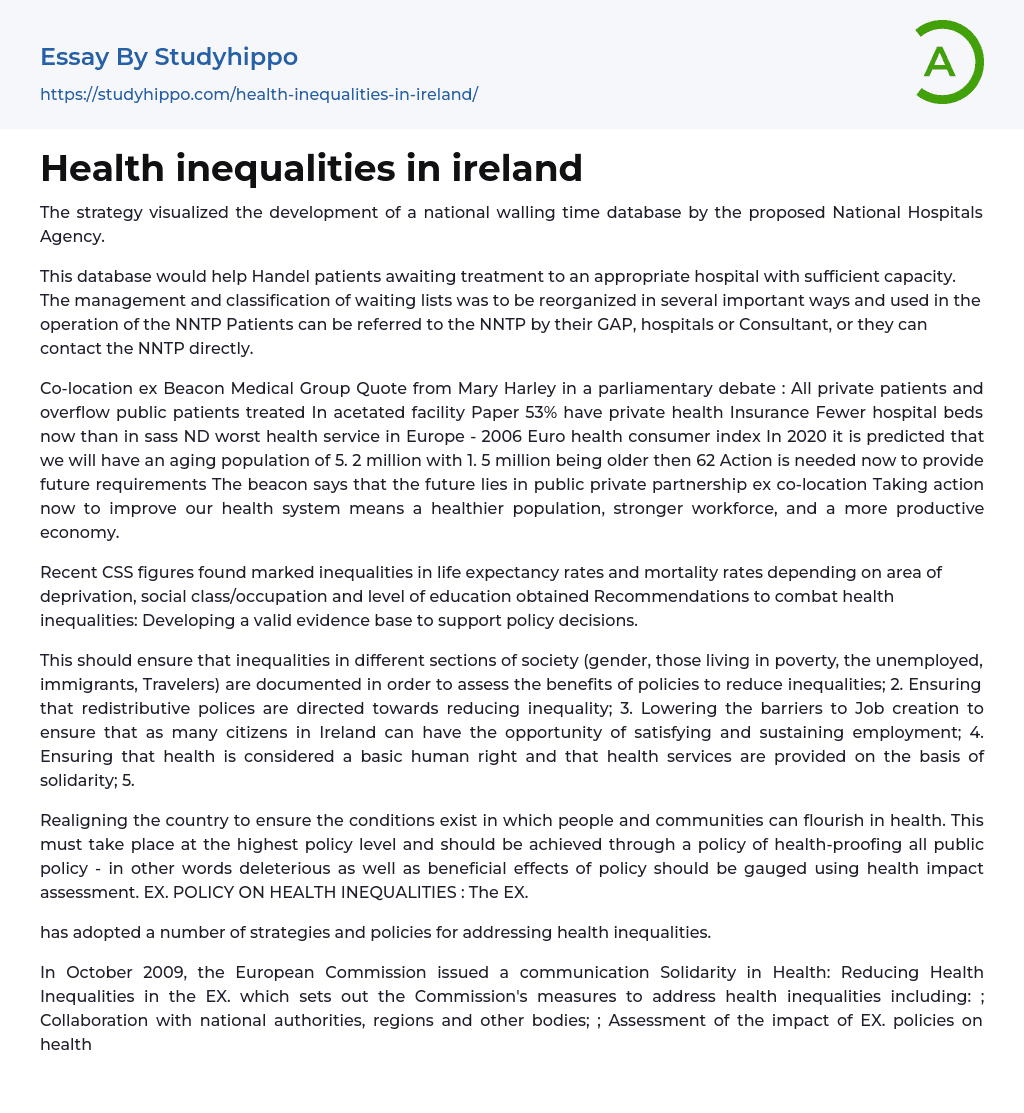The National Hospitals Agency's proposed strategy involves creating a national database to track the waiting times of Handel patients seeking treatment. The aim is to redirect them to hospitals with available capacity, and reorganize existing waiting lists for use in the operation of the NNTP. Patients can be referred by their GAP, hospitals or Consultant, or contact the NNTP directly.
During a parliamentary debate, Mary Harley stated that private and overflow public patients will be treated at an acetated facility provided by Beacon Medical Group. Despite 53% of patients having private health insurance, there are fewer hospital beds than in previous years, making it Europe's worst health service according to the 2006 Euro health consumer index. With an aging population predicted for 2020, action must be taken now to meet future requirements.
Beacon suggests public-private partnerships (e.g., co-location) as the way forward. Improving healthcare will l
...ead to a healthier population, stronger workforce and more productive economy. CSS figures show unequal life expectancy rates and mortality rates based on area deprivation levels and social class/occupation.
EX has implemented several initiatives aimed at combating these inequalities using evidence-based policy decisions.The goal of combating health inequalities involves documenting disparities in societal sectors such as gender, poverty, unemployment, immigration, and Traveler status. Policies aimed at reducing injustice must ensure that redistributive measures are targeted towards inequality reduction and advocate for lower barriers to job creation. Effective strategies also recognize the right to health as a fundamental human right and prioritize healthcare services based on solidarity. The country's policies must be realigned to promote health for all citizens and communities. To achieve this goal, policies should be implemented at the highest level with
a focus on health-proofing all public policy decisions through health impact assessments that assess both positive and negative outcomes.
The European Commission's Solidarity in Health communication released in October 2009 outlines steps to reduce health inequalities by collaborating with various national and regional bodies while evaluating their actions' effects. For feasible reductions of health inequalities, EX.'s policies must adhere to the Health in all Policies strategy approach targeting social determinants of health through cohesive responses among relevant policy areas.
Accordingly, The Council's declaration recognizes common values and principles crucial for maintaining high levels of social retention contributing to social cohesion, justice, sustainable development within EX.'s healthcare systems formation.Regular reporting on inequalities, successful strategies, and funding transparency are necessary to assist sectional authorities and other bodies in improving the health system. A report advocating for this reform must prioritize equality as one of four integral pillars, alongside a people-centered service, wealth of care, and clear accountability. Despite these efforts, unacceptable waiting times and underdeveloped services persist in the public sector due to demographic challenges. Therefore, the strategy should prioritize quality and fairness for all individuals seeking healthcare services.
Equality is crucial to catalyze change in the health care system. Once achieved, planning and funding of acute hospital services will naturally improve based on service levels with increased transparency in their delivery. To ensure an effective health system, social, economic, environmental, and cultural factors that influence health must be considered. Prenatal life and early childhood are important determinants impacting adult health where lack of emotional support or slow growth during these stages increase lifetime risks of reduced physical cognitive or emotional functioning.Social networks and families are vital in supporting individuals'
health by providing information and helping to improve access to health services. Other factors that impact health include education, employment, housing, work environment, agriculture, food production, water and sanitation, and healthcare. The socio-economic, cultural and environmental conditions significantly influence an individual's social and educational pathway throughout their life. To enhance health outcomes for all people within the community, a strategy has been devised which involves working with everyone within the healthcare system as well as engaging more broadly with the community. Evaluating services is necessary to reform delivery of programs while simultaneously modernizing and expanding existing facilities. Additionally, supporting people’s development within this system is crucial in enhancing the overall effectiveness of these efforts.
This strategy was developed based on four principles: equity targeting health inequalities; people-centeredness; quality; accountability. By prioritizing equity we can ensure fair treatment for all based on need while also ensuring that everyone has an equal opportunity to attain their full potential when it comes to good health. People from lower socio-economic groups often suffer more ill-health than others due to social determinants such as education or nutrition- acknowledging this fact is critical when upholding the National Development Plan which focuses on improving overall equity across all areas including social economic status or environmental factors like housing availability.
The 1999 Report of the Chief Medical Officer highlighted a growing need for radical action towards addressing inequality in healthcare provision so that every person regardless of background can have equitable access to effective care strategies moving forward.
Equitable access to healthcare, irrespective of geographical location and financial status, is imperative. The current system has been criticized for its perceived unfairness and unequal treatment. Enhancing accessibility
will enhance health outcomes by eliminating obstacles to services and making people aware of their entitlements. Prioritizing equity in policies can mitigate health inequalities across social groups in Ireland. Furthermore, access to services should be predicated on necessity rather than influenced by income or other factors.




